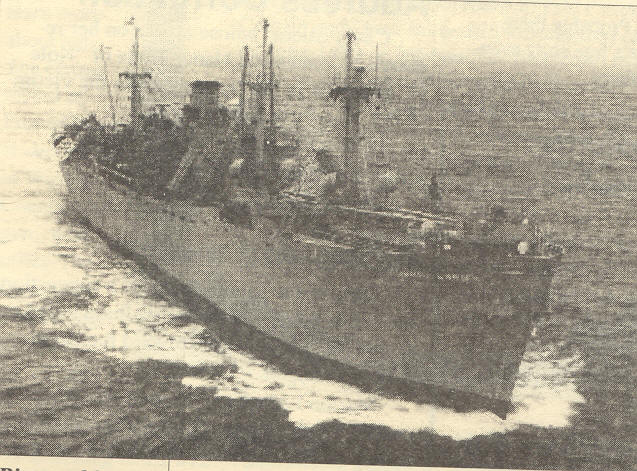
Branch 1
WWII Liberty Ship honored "Father of Indiana Agriculture"
By Lawrence Sullivan
"To the strains of Back Home Again in Indiana, with flags and pennants flying and sparkling champagne foaming down her bow, a great ship, the SS W. C. Latta, came alive and slid from her cradle into the launching canal at the Delta Shipbuilding Co., New Orleans, LA., April 12 [1944]."
With these stirring words the Lafayette (IN) Journal and Courier heralded the launch of a Liberty Ship named in honor of a man recognized as "the father of Indiana agriculture."
William Carroll Latta joined the faculty of Purdue University in 1882, when the school was only eight years old, and established its agriculture department. As a scholar, editor and innovator in off-campus education, he held the position of professor of agriculture for 53 years until his death at the age of 85.
Although the actual war record of the shop named in his honor is not known, she hit the waves just in time to take part in the D-Day assault on Normandy, the 6th of June, 1944.
The hometown newspaper enthused patriotically: "If the sea trials prove satisfactory, she will be ready to poke her nose into the Atlantic or Pacific, or another of the other oceans where U.S. Liberty Ships are called upon to deliver the supplies in America's far-flung battle fronts."
Liberty Ships were truly the ugly ducklings of the U.S. Navy, but their contribution to the war effort was incalculable. Most were mothballed immediately after the war, but a few remained in service at scattered locations around the globe. Some, creaking with age and rust, were even called upon nearly 10 years later to haul troops and material to a new war in Korea.
Like thousands of her sister vessels, the SS W. C. Latta was finally dismantled for scrap metal in 1962. A representative of the U. S. Maritime Commission brought the ship's nameplate, carefully preserved and mounted on a plaque, to West Lafayette and presented it to Purdue officials in a brief ceremony at a luncheon meeting of the Rotary Club.
Professor Latta, who "loved to partake in outdoor games with youngsters of any age," in his daughters' words, undoubtedly would have been pleased that his name had been proposed for a Liberty Ship by 4H Club boys and girls.
For early half a century Hoosier youngsters tested their knowledge of farm life, ranging from animal husbandry to fruit growing and canning, in statewide competition called "The Latta Games."
A biographical sketch presented to the shipbuilding company by daughters Bertha and Mary Latta summarized Professor Latta's accomplishments in these words:
"He pioneered the check plat system of crop and soil studies, which is still the basis of such work. He exerted a strong force in the early development of good roads, rural free delivery of mail, and domestic science courses for girls.
He established Indiana's Farmer's Institutes and directed them for 34 years, later acting as consulting specialist and editor for the Agricultural Extension Department, which had absorbed the Institutes and greatly expanded the scope of this type of bringing the college to the farmer..."
Beyond his college duties, his daughters said, "Mr. Latta was a tireless worker in the Methodist Church and the YMCA, in temperance work, and in the betterment of rural churches."
64 WILLIAM CARROLL (6) LATTA of Branch #1 - as he is designated in family genealogical records - was born 9 March 1850 in LaPorte County, Indiana. He was the eldest child of Robert Seegar Latta (1826-1900), a farmer and itinerant Methodist minister, and Mary Tumbleson Latta (1828-1907). After living most of their lives in Noble County, Indiana, the parents homesteaded in Nebraska in the 1880s and died there.
Professor Latta was one of the first graduates of Michigan Agricultural College (now Michigan State University) to continue his studies and receive a Master's Degree. He returned to his native Indiana, and Purdue, immediately after getting that advanced degree in 1882.
Will, as he was known to the family, worked his way through college doing chores at a farm in Ingham County, Michigan, just a few miles from campus. In addition to getting spending money and valuable experience at this well-run farm, he also won the hand of the farmer's daughter, Alta E. Wood. She prided herself as being tenth in descent from Elder William Brewster, who came over in the Mayflower with the Pilgrims in 1620.
I lack a date of death for Alta, who was born 16 March 1854, but her husband died 22 December 1935 at their home adjoining the Purdue campus.
They had three daughters, Bertha and Mary Latta and Mrs. H. J. (Pauline) Reemtsma, and one son, Robert W. Latta, all of whom graduated from Purdue.
Their only granddaughter, Carol Reemtsma, enjoyed the starring role at the christening. It was her task to smash a bottle of champagne against the bow of the SS W. C. Latta. The frothy waste surely would have delighted the temperance-minded father of Indiana agriculture, who greatly preferred eating grapes to crushing them. ■

Pictured is a Liberty Ship similar to the SS W.C. Latta